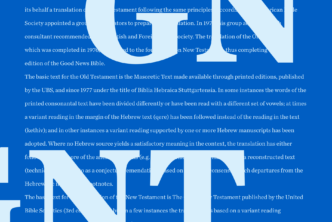On the subject of Steve and discourse grammar, there was a helpful exchange in the comments of Steve’s last blog post, which I thought it would be worth calling your attention to.
A commenter asked,
My main quandary when considering the LDGNT has to do with objectivity vs. subjectivity in conducting discourse analysis. I am inexperienced and basically ignorant of the concept of discourse analysis. I read some of Bill Mounce on the topic. What I would like to know is given that a particular scholar, in this case Dr. Runge conducts the analysis of the entire GNT, would another scholar arrive at the same kinds of results or would there be numerous differences with results? More or less, I am asking about “bias”. Would I become a Rungeianite? And I say that in all well intended humor. :)
Perhaps you’ve had the same question. Some components of grammar are more objective than others. Many—though certainly not all—aspects of morphology tend to be fairly objective and agreed upon by scholars. Syntax, on the other hand, involves a bit more subjectivity. What about discourse? How objective or subjective is the work that Dr. Runge has done?
Here’s Steve’s helpful response:
You ask a great question. Most of what I have analyzed is fairly objective in nature, and could be replicated by others using a comparable interpretive framework (i.e. a functional, cognitive approach to discourse typology). What I am doing is better characterized as *discourse grammar* as opposed to *discourse analysis*, with the latter focused on trying to find the overall structure and message of a book. My analysis would give you the building blocks for doing such an analysis, but is more focused on documenting grammatical features and describing their discourse function. Each blog post has focused on one grammatical phenomenon and then described the task that it accomplishes in the discourse. I have striven to annotate only well documented, well attested discourse features. Most of what I have annotated relies upon the research of translators and other linguists. Other parts are original research which has either been peer-reviewed or presented at conferences for feedback.
There are indeed aspects that involve subjectivity, as is the case with some of the decisions regarding the block outline. Let’s say there is a main clause with a subordinate clause, followed by a coordinate clause (linked by και ‘and’). Which clause does the coordinate clause link to: the main clause or the subordinate clause? Grammar alone cannot answer this question. In most cases the decision is fairly objective, but there are times when a good case could be made either way. This project is intended to function as a commentary, something that you interact with in order to ensure you engage all of the relevant issues related to the passage. In the same way that you might disagree with a commentator, I expect that some will disagree with judgments I have made.
I have posted conference papers presented at SBL and ETS at www.logos.com/academic/bio/runge. I also chair a new section at ETS called ‘Discourse Grammar and Biblical Exegesis’, focused on making discourse-related research more accessible to biblical scholars. These papers document the research underlying the HDNT analysis, and include footnotes and bibliographies for readers.
For more information about what Steve has been working on here at Logos, see the following:




